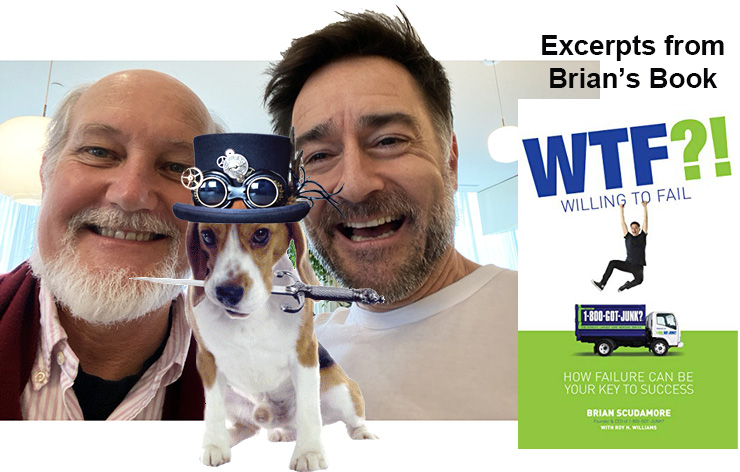I got a Dad when I was seven.
Charles Scudamore was studying to become a doctor, and lucky for me, he fell in love with my mother.
“I do.”
“I do.”
“And I’m with her. It’s sort of a package deal. Hi, my name is Brian.”
Then WHOOSH, Charles Scudamore whisked Mom and me from our home in San Francisco to Vancouver, which is in a whole other country.
So now I’m a foreigner, a 7-year-old American in Canada, and the only thing I cared about – the only thing I really wanted – was to fit in, to belong, to have friends.
I’ll bet you’ve always wanted that, too.
My problem was that I tried too hard. I became the class clown, always making fun of other kids in an attempt to get a laugh, get noticed, be accepted. I became an expert at pushing people’s buttons and yanking their chains.
I hope you never did that. If you did, I’m sure you learned the same thing I learned; those other kids just wanted to be accepted, too. And my teasing was making them feel rejected.
It took me 6 long years to figure out that making other people feel bad wasn’t the best way to make them want to hang out with you.
Here’s how I survived those lonely years of being the class clown, the disruptor, the troublemaker: I went home during recess. Our house was a stone’s throw from the school, so I’d always be quick out the door, then run to my house and sit alone until I heard the bell that signaled end-of-recess. I’d watch out the window until everyone who wanted to kick my ass had gone back inside, then I’d trot to school and rejoin the class.
Getting home at the end of the school day was a little more tricky. I got beat up a lot until I discovered a secret getaway. When the other kids were walking toward the school exit, I’d walk the other direction to the school library. Then, when no one was looking, I’d slip out the emergency exit door which was almost directly across from my house…
A couple of chapters later…
San Francisco to Vancouver to England to… Hong Kong?
“Or you can go back to Vancouver and live with your grandmother.”
The only thing that frightened me more than moving back to Vancouver was being the new kid in a country where I didn’t even know how to say hello.
“Hello, Grandmother.”
“Oh, Brian, it’s so wonderful to see you! I love you so much.” And then she smothered me with a big “grandmother” hug.
After the hug, she held me in both of her hands at arm’s length and smiled as she said, “Honey, we need to get you some clothes and a haircut.”
My grandmother was a life-changer.
I’m betting you’ve had a person like that in your life; someone who liked you just for who you were, not for anything you had done. Someone who cared enough to help you get past your blind spot.
A few hours later, I was stylin’. If I’d had a hat, I would’ve cocked it down low over one eyebrow and walked with a dip in my step.
No, I probably wouldn’t have worn a hat. I would have wanted everyone to see my new “cool guy” haircut.
Needless to say, the kids at school met a whole different Brian than the one who had left Vancouver a year and a half ago. Luckily, I had accumulated just enough wisdom during those 18 months to play it soft and easy. Shoulders back, head high, this “new and improved” Brian spoke with a bit of a British accent and was easier to be around than the smart-mouthed, frightened, hurting Brian who fled this town 18 months ago.
Circumstances did some of the work for me. I’m not sure who I would have become in England if I had let Steve push me around on the playground.
And my new friends in England altered my self-image as well. I learned during my time with them how important it is for people to feel safe, how to encourage them and make them feel special.
But it was my grandmother who put the icing on my cake. She saw me real and loved me enough to help me get beyond my blind spot.
Brian’s companies will do about half a billion dollars this year. It’s definitely a book worth reading. – Indy Beagle
